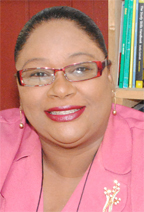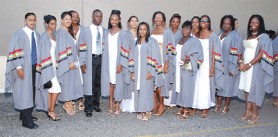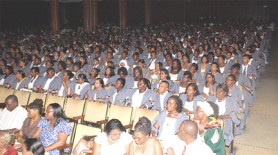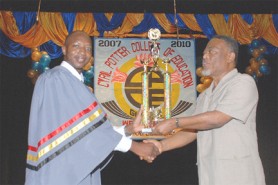On the Associate Degree and Bachelor’s Degree programmes for teachers being offered by the Cyril Potter College of Education and the University of Guyana

“Currently, it takes a teacher three years to complete the programme of studies at the Cyril Potter College of Education. (CPCE). You then have to wait an additional two years before you can enter the University of Guyana to do the four-year Bachelors in Education degree. That is a total of nine years if you count the two years that you have to wait between the CPCE and UG. If you do the Associate Degree at the CPCE now (with effect from September 2010) and you have the opportunity thereafter to go straight to UG, you are looking at three years at CPCE and two additional years at UG. So you have a full degree in five years. If a teacher can benefit from this arrangement you can then begin to see your prospects of moving upward in the education system. Apart from the fact that teachers are now less likely to want to leave the profession I believe that they will now find teaching more rewarding. The big impact, of course, is that we will now be able to produce a better quality of teacher.”
On better emoluments for teachers
All over the world teachers are the underdogs. underpaid. Comparatively, in any country, teachers are underpaid. That is not to make a case for teachers being underpaid in Guyana. but that the reality is that being underpaid is really not the issue at the moment because more qualifications mean higher pay. Even in a profession that is not paying enough it still means better pay. Many of us in the profession who actually thought of not going to the university ended up going because we were not just looking at the pay At that point we were looking at the satisfaction and in education we talk about intrinsic and extrinsic motivation.

On claims that teaching has lost its position as a ‘status profession’ in Guyana
Teaching was and still is seen as a status profession. In the past, that status was bestowed upon all teachers. Now, it is selective. People in Guyana put teachers on a pedestal and, unfortunately, we allow you to bring yourselves down. You come into this profession and a while community embraces you. It is you who can either sustain that status or throw it to the dogs. Our teachers, on the whole, are working very hard to sustain that status.
On attracting the best academic minds to the teaching profession
At the moment CPCE is indeed attracting some of the best post-CSEC students. This is beginning to happen more these days. We wish, however, that we could attract more such students. There was a time in Guyana when employment was limited mostly to being a teacher or a nurse or a clerk in the Public Service. Today, our children have the opportunity to say I want to be an astronaut and that child has the opportunity of going through our education system and going on the fulfilling of that dream because scholarships are available in larger numbers. The competition is greater. What is interesting, however, is that all of the persons who have ever become anything have come out of our school system. We have been able to give the best to the rest of the world then we take the rest and use it.

On the popular perception that the current generation of teachers is less caring than their predecessors
“That is a view that has been shared by a number of persons. But there are two sides to the coin. What has happened in recent times is that the turnover rate has not allowed our teachers to evolve into being the quality and the kind of teachers that the profession is expecting of them. Creating a caring teacher is not an overnight achievement and very of ten our teachers do not stay long enough in one place to allow growth to take place within them. Among those teachers who do stay in once place for three, four or five years, you still find that care and concern. Its not that it isn’t there. Its just that it, perhaps, isn’t there as much as it ought to be. Additionally, it has to be pointed out that our education system is a function of the wider society and, frankly, the world as it stands now is not as caring as it used to be. A little while back we used to have most mothers at home. We have the latch key children now. They are going home on their own. The whole situation is now different. The extended family is diminishing; and so you do not seem to have a number of responsible, caring adults who will take up the slack.
On ‘values’ as a component of the curriculum
As a teacher you come into the job as an adult. You would have had a community that would have shaped you. We must also bear in mind that our school system is a gathering of all strata of society. There are those who have got good home values and those who have none. Those who understand what discipline means and those who don’t. The bottom line is that we have them al thrown in together and our teachers come from those same places. There is some amount of formation that takes place at CPCE but formation and time are twin brothers. Formation cannot be rushed.

On the quality of our teachers and the availability of resources in the national education system
Right now, and amidst all of the challenges there are still teachers who are delivering at a very high level. Contrary to the thoughts out there that the students have to go to additional lessons in order to add to curriculum delivery, I want you to know that the lessons that they go to are run by the same teachers. The fact that they are still able to pass the examination says that our teachers have the ability to deliver. At no time in the history of education in Guyana did we have as much material to support the delivery of the curriculum in all schools as we have now. And I am not only talking text books; I am talking about all the other support material. Do we need more? Of course we do. Yes. But I want to say that, obviously, our strategic plan is beginning to kick in. We are beginning to see returns even though it is early in the five-year plan.
On infusing Guidance and Counselling into the teacher training curriculum
One of the things that we have been trying to roll out is Health and Family Life Education. This programme seeks to provide the beneficiaries with life skills which would include stress management, conflict resolution, decision-making, choices and several others. Our teachers in College are now having a well-rounded knowledge of these disciplines. It takes a while to build up and now we are intensifying. We are now looking to make adjustments to that curriculum to expand on citizenship education. Our teachers are also trained to have a greater appreciation for the challenges facing students. Part of managing the children is understanding the environment that they are coming from. We have started to introduce Guidance and Counselling Officers in schools. We cannot beging with a thousand. We have to do it incrementally and we are beginning to see the benefits of that. The welfare system has also been improved.
On school, parent and teacher as a community
If the Ministry of Education wants to signal to the nation that this is important then the Ministry has to place importance on PTAs’. This has been done by appointing someone ago is accountable. Secondly, we have created the policies that have caused Head Teachers to bring the school and the community together. We have in place a Teacher Award Scheme which allows the communities to identify those teachers who are delivering. The community is already involved. Perhaps we need greater involvement. We have started a mentoring programme and the second batch of mentors is currently being trained. Most of our teachers are delivering far beyond the call of duty but you will always find the handful who have lost their way. We have to work with those.
On measurable growth in the education system
The reality is that a larger percentage of our students is receiving the opportunity to move themselves forward. There was a time when a handful of students wrote the CXC or the GCE. The numbers have grown. Within the last few years we have from 6-7,000 to 10-11,000 writing the examination. This is only one indication of the growth in opportunity which the education system has provided for people who want to take advantage of it.
No child left behind
We want everyone to at least be able to read and write. That is why, in our education system we are not just satisfied with having the CSEC and the CAPE examinations. We have move on to deliver the Secondary Competency Certificate Examination. That is a competency-based programme to help students who might not be interested in an academic orientation. The Secondary Competency Certificate Examination caters for the four core areas. We want to make sure that the education that we offer has something for each and every student.
Remedial measures to take account of underachievement
Some of the issues that we are addressing are issues that might have been ignored. What we want, however, is greater value, greater accountability. We want a greater visibility in terms of the equity that we are talking about.
We want to say equal access and mean equal access. When students enter secondary school after the Grace Six examination you have, on the one hand, those ‘high fliers’ and then you have those others who do not perform as well. We understand that if we allow the lesser achievers to go through secondary school like that we are always going to find ourselves with struggling students. Rather than have our students spending five years in High School struggling and always feeling as though I am less adequate than my colleagues, we want to give them a full year to bring up their standards. What we have done is to offer the six-year transitional curriculum, a curriculum that focuses on the four core areas and reading. We have trained 310 teachers across the length and breadth of Guyana to deliver that curriculum. We have placed more than 60 retired teachers in our schools who have come to us with the extra skills associated with managing remedial children. We have also given them the tools to help them to develop the competencies to work smarter.
We are aware that it is an additional weight on the system and we have catered for that both in terms of training and in terms of hiring more persons. We expect those students who are currently part of the remedial programme to be in a much better place at the end of the exercise. Achild, for example, might have secured the overall pass mark at the end-of-year examination but may have fallen below the pass mark in Mathematics and English.
Our focus is on Mathematics, English and Reading because we do believe that those subjects are the fundamentals for their education. If you do the mathematics, for example, and you get your thinking straight and you get your sequencing of thought and you processing skills and your analytical skills right; that you are going to be a better human being. Apart from being a better mathematics the training will also help you with issues like conflict resolution, management of time and resources. All of these come out of developing a better understanding of mathematics. We understand too that if we fix the problems that arise in English our students are likely to be able to cope better with all of the other subjects. Getting their reading skills together will also help their listening comprehension. I believe that if we work with these children they are going to be in a much better place in six weeks time. In education we talk about two simple words, recency and frequency. If you want a child to learn the content has to be recent. The frequency and the repetition facilitates better retention. In the programme we are asking the children to concentrate on these three areas rather than on thirteen or fourteen areas in the normal curriculum.
On getting more parents to ‘buy into’ their children’s education
There is a wide scope out there for parents to work with their children. It is something that the Ministry of Education encourages and promotes. We encourage parents to come to PTA meetings, we have parent conferencing. We are using several methods to try to get parents to play a bigger role. What helps are those success stories that actually involve parents in helping their children. I would want more parents to do more for and with their children A lot of parents are doing things for their children. They are buying them books and they are sending them to lessons and summer programmes. What parents are not doing enough is doing things with their children.
On extending the retirement age for teachers
While it is not my place to decide that, as a citizen of this country I would like to think that if we look at our Caribbean neighbors, for example, we would recognize that people retire at an older age. It is for us in Guyana to make a determination as to whether or not that would work for us.
Is the education system meeting its targets
I would say, yes. It is the same education system that produces all the mathematicians that we throw into engineering; who will take all of the science people and throw them into medicine; If the education system has not been able to give itself what it needs it has been able to give the rest of the nation much of what it needs.




